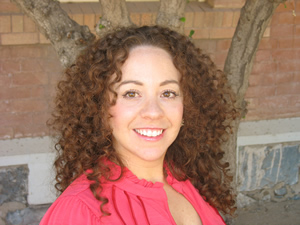Superfund Research Program

Monica Ramirez-Andreotta is the fourteenth recipient of the annual Karen Wetterhahn Memorial Award. The award was presented at the Superfund Research Program Annual Meeting on October 25, 2011, in Lexington, Kentucky. Ramirez-Andreotta was credited for her commitment to engaging the residents of the local community in her research and empowering them with her results.
Ramirez-Andreotta is a doctoral student under the guidance of Raina Maier, Ph.D. in the department of Agriculture and Life Sciences at the University of Arizona (UA). In December of 2012, she will complete her PhD in Environmental Science, focusing on integrating the fundamentals of environmental science, human exposure assessment, and methods to positively harness community knowledge and activism.
Her UA career began upon the completion of her Masters of Public Administration in Environmental Science and Policy from Columbia University, when she accepted a position as the Research Translation Core (RTC) Leader within UA’s SRP Center. As the core leader, she dynamically communicated and applied knowledge from fellow SRP researchers to increase human capacity and information dissemination among stakeholders. She was particularly active in building partnerships with U.S. and Mexican government agencies, creating web-based and other innovative bilingual communication tools, and participating in local community events.
After 5 years in the role of RTC Leader, Ramirez-Andreotta entered the UA graduate program as a doctoral candidate and undertook a project she has named Gardenroots. In this project, she conducted two complementary projects to understand how metals are being taken up by vegetables planted in home gardens adjacent to the Iron King Humboldt Smelter Superfund site in Dewey-Humboldt, Ariz. The first was a citizen science study, where Ramirez-Andreotta teamed up with local gardeners and collected samples to evaluate vegetable metal uptake in their home gardens. The second, concurrent project was a controlled laboratory study evaluating vegetable uptake in a greenhouse setting.
The Gardenroots program revealed that the community’s municipal water supply was exceeding arsenic regulatory standards. The community and Ramirez-Andreotta notified the U.S. Evironmental Protection Agency and Arizona Department of Environmental Quality and continued to pressure the regulatory agencies as well as the municipal water supply. In response, the municipal water company was issued a Notice of Violation. As stated by a Gardenroots participant, “The people in Humboldt served by Humboldt Water System are deeply indebted to Ms. Ramirez-Andreotta’s study which served to reveal a serious problem with the municipal water.”
Monica has compiled the results from her dissertation research, Gardenroots, the Dewey-Humboldt, AZ Garden Project, and in response to interest from gardeners around the state of Arizona, she has been on the road to provide presentations describing the results of her study on metals uptake in garden vegetables.
The NIEHS congratulates Ramirez-Andreotta on her accomplishments and wishes her continued success in her career.


